Yet, as cinemas are still closed in Germany, the organisers will stream for one week films that were supposed to be shown last November. From 20 May you can watch De Jantjes/The Tars (Jaap Speyer, 1934), Die Reise nach Tilsit/The Trip to Tilsit (Veit Harlan, 1939) with Dutch actor Frits van Dongen, a silent documentary program on Rotterdam (including Andor von Barsy's De stad die nooit rust/The City That Never Rests), and the film (Ewiger) Rembrandt (1942) by Hans Steinhoff, starring Ewald Balser as the Dutch painter.
From 27 May you can watch the thriller Obsessions (Pim de la Parra, Wim Verstappen, 1969) coproduced by and starring Dieter Geissler, a German silent program with films from Eye's Desmet Collection (including Lissi Nebuschka in a drama shot in Volendam), the drama Charlotte (Frans Weisz 1981), Gegenschuss - Aufbruch der Filmemacher (Laurens Straub, Dominik Wessely, 2008), and the silent comedy Hurra! Ich lebe!/Hurray! I Live! (Wilhelm Thiele, 1928) starring Russian actor Nicolas Koline. All films will be introduced, in German, by the organising team. All silent films will be offered with newly composed and recorded music by Daan van den Hurk and others.
Between 14 and 16 May you can already watch two films made in the DDR: Joop Huisken's propaganda film Daß ein gutes Deutschland blühe (1959), shown in two versions, and the fairy tale Wie heiratet man einen König/How to marry a king (Ralf Simon, 1968) with Dutch actress Cox Habbema. See Cinefest.de.
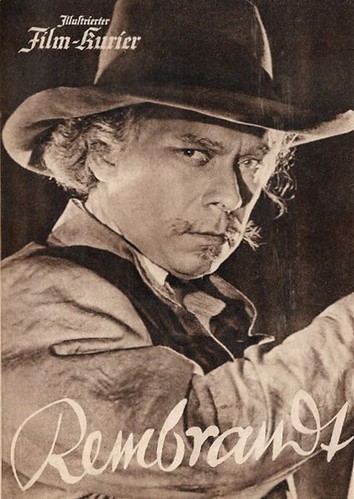
Cover of the special issue of Illustrierter Film-Kurier on the German biopic Rembrandt/Ewiger Rembrandt (Hans Steinhoff, 1942), with Ewald Balser in the title role.
Rembrandt
German actor Ewald Balser (1898-1978) appeared in 53 films between 1935 and 1975. On stage, Balser was a star character actor, renowned for portraying larger-than-life historical figures. Invariably in heavy make-up, he generally appeared older than his actual age. His best film performance was as Rembrandt van Rijn in Rembrandt/Ewiger Rembrandt (Hans Steinhoff, 1942).
Rembrandt (1942) was shot both at the Dutch film studio Cinetone and the near The Hague-based Filmstad studio, during the German Occupation of the Netherlands in World War Two.
It was the first German film production in Holland during WWII, made between 1941 and 1942. Afterward several would follow, mainly by the newly founded company Berlin-Film. While the cast was fully German, some crew members were Dutch such as assistant director Charles Huguenot van der Linden.
Leading in the cast were besides Balser, Herta Feiler (Saskia), Elisabeth Flickenschildt (Geertje), Gisela Uhlen (Hendrikje), Theodor Loos (Jan Six), Aribert Wäscher (Uijlenburgh), and Paul Henckels (etcher Seeghers).
Small parts were for well-known routinés such as Eduard von Winterstein, Frida Richard, Nicolas Koline, Angelo Ferrari, and Victor Janson, according to IMDb. Sets were by Walter Röhrig, famous for his art direction of Expressionist cinema.
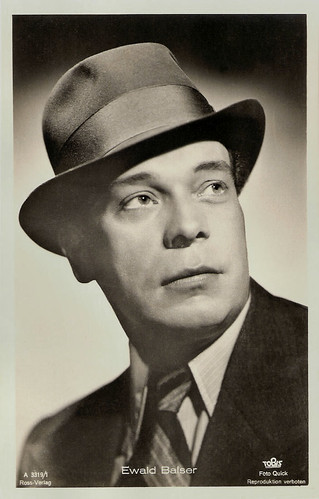
German postcard by Ross Verlag, no. A 3119/1, 1941-1944. Photo: Tobis / Quick.

German postcard by Ross Verlag, no. A 3123/1, 1941-1944. Photo: Bavaria Filmkunst. Ewald Balser in Das Fräulein von Barnhelm/The Girl from Barnhelm (Hans Schweikart, 1940).

German postcard by Ross Verlag, no. A 3296/1, 1941-1944.
Heroic roles in classical plays
Ewald Balser was born in Elberfeld (now Wuppertal), Germany in 1898. He was the youngest of eleven children of the bricklayer Wilhelm Balser and his wife Mathilde, née Lohe.
Balser originally learned the profession of a goldsmith at the Elberfeld School of Applied Arts and was a soldier from 1916 until he was wounded in 1917. After World War I, he worked in the profession he had learned.
He also took acting lessons and took on minor roles at the United Theaters of Elberfeld-Barmen. In 1919, Balser made his theatre debut at the Stadttheater Elberfeld as Odoardo in 'Emilia Galotti' by Gotthold Ephraim Lessing.
During the 1920s, Balser forged a theatrical career and worked in Basel, Düsseldorf, Berlin, and Munich. At the end of the decade, he went to Vienna and joined the ensemble of the Burgtheater as actor/director.
On stage, he played chiefly heroic roles in classical plays. Guest performances took him to the Salzburg Festival. In 1933 he moved to Berlin, where he was a member of the Volksbühne ensemble and, from 1935, of the German Theater.
Balser was listed on the God-gifted list of Reich Propaganda Minister Josef Goebbels as an important artist of the Nazi state.

German postcard by Film-Foto-Verlag, no. A 3657/1, 1941-1944. Photo: Bavaria Filmkunst.

Vintage postcard by L&O, no. 65359. Photo: Ellinger. Ewald Balser as Faust in the stage play 'Faust' (1937) by Johann Wolfgang von Goethe directed by Max Reinhardt at the Salzburger Festspiele.
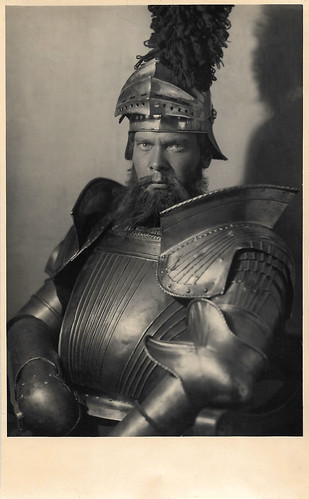
Austrian card by Hans Dietrich & Co., Wien. Ewald Balser as Götz von Berlichingen in Goetz von Berlichingen (Alfred Stöger, 1955). It is a filmed version of the 1773 play 'Götz von Berlichingen' by Johann Wolfgang von Goethe.

Austrian card by Hans Dietrich & Co., Wien. Ewald Balser as Die Stimme des Herrn (The voice of the lord) in Jedermann/Everyman (Gottfried Reinhardt, 1961) based on the 1911 play of the same title written by Hugo von Hofmannsthal.
Important historical personalities
In 1935, Ewald Balser made his screen debut in Jana, das Mädchen aus dem Böhmerwald/Jana, the Girl from the Bohemian Forest (Robert Land, 1935) with Leny Marenbach.
He often played a serious figure in film dramas, such as doctors, priests, bishops, artists, and other people of respect. Balser had his breakthrough as the Dutch painter Rembrandt van Rijn in Rembrandt (Hans Steinhoff, 1942) and increasingly, he made a name for himself in roles of important historical personalities.
Ewald Balser was able to continue his career smoothly after the Second World War and when the Burgtheater reopened, he played the role of Primislaus Ottokar in Franz Grillparzer's 'König Ottokars Glück und Ende' (The Fortune and Fall of King Ottokar).
He was also the first-ever Jedermann in 'Jedermann. Das Spiel vom Sterben des reichen Mannes' (Everyman. The play of the rich man's death) by Hugo von Hofmannsthal to be seen at the Salzburg Festival after the suppression of National Socialism.
In the cinema, his popularity even increased in the 1950s. Balser was critically acclaimed as Professor Sauerbruch in Sauerbruch – Das war mein Leben/The Life of Surgeon Sauerbruch (Rolf Hansen, 1954), Emperor Franz Ferdinand in Sarajevo (Fritz Kortner, 1955), and Ludwig von Beethoven in Eroica (Walter Kolm-Veltée, 1949) and again in Das Dreimäderlhaus/The House of Three Girls (Ernst Marischka, 1958) with Karlheinz Böhm.
During the 1960s, he concentrated largely on theatrical work. In 1963 he became an honorary member of the Burgtheater.
Balser's first wife was the actress Vera Balser-Eberle. From 1950 he was married to Ernestine Bauer, the mother of his daughter Evelyn. He collapsed during a performance in 1976 and died of cancer in 1978 in Vienna. He was 79. His honorary grave is in the Neustift cemetery. In 1982 the Ewald-Balser-Gasse in Vienna-Liesing was named after him.

German postcard by Rüdel-Verlag, Hamburg-Bergedorf, no. 80. Photo: Junge Film-Union / Herzog / Wesel. Ewald Balser in Sensation in San Remo (Georg Jacoby, 1951).

German postcard by Rüdel-Verlag, Hamburg-Bergedorf, no. 935. Photo: Corona / Schorcht. Ewald Balser as Dr. Ferdinand Sauerbruch in Sauerbruch - Das war mein Leben/The Life of Surgeon Sauerbruch (Rolf Hansen, 1954).
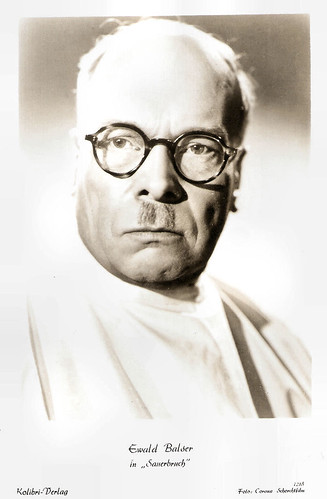
West-German postcard by Kolibri-Verlag, no. 1218. Photo: Corona / Schorchtfilm. Ewald Balser as Dr. Ferdinand Sauerbruch in Sauerbruch - Das war mein Leben/The Life of Surgeon Sauerbruch (Rolf Hansen, 1954).

German postcard by Ufa/Film-Foto, Berlin-Tempelhof, no. FK. 2083. Photo: Lars Looschen / Amandus-Film / NF. Ewald Balser in Versuchung/Temptation (Josef Fuchs, 1955).
Sources: Wikipedia (English and German), and IMDb.
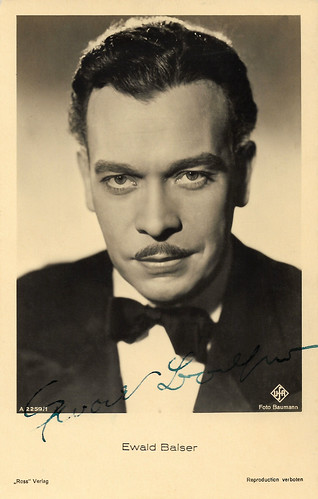
No comments:
Post a Comment